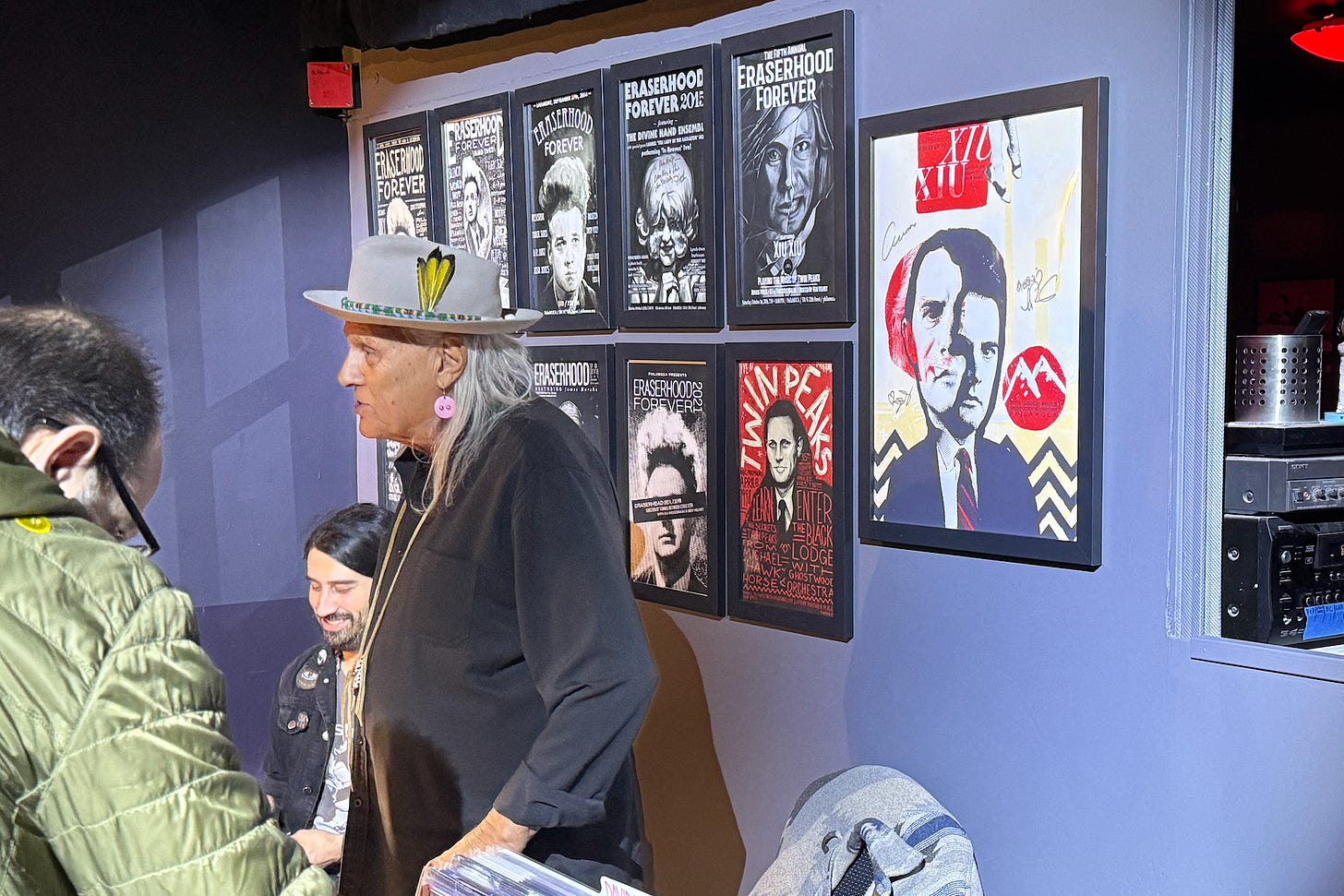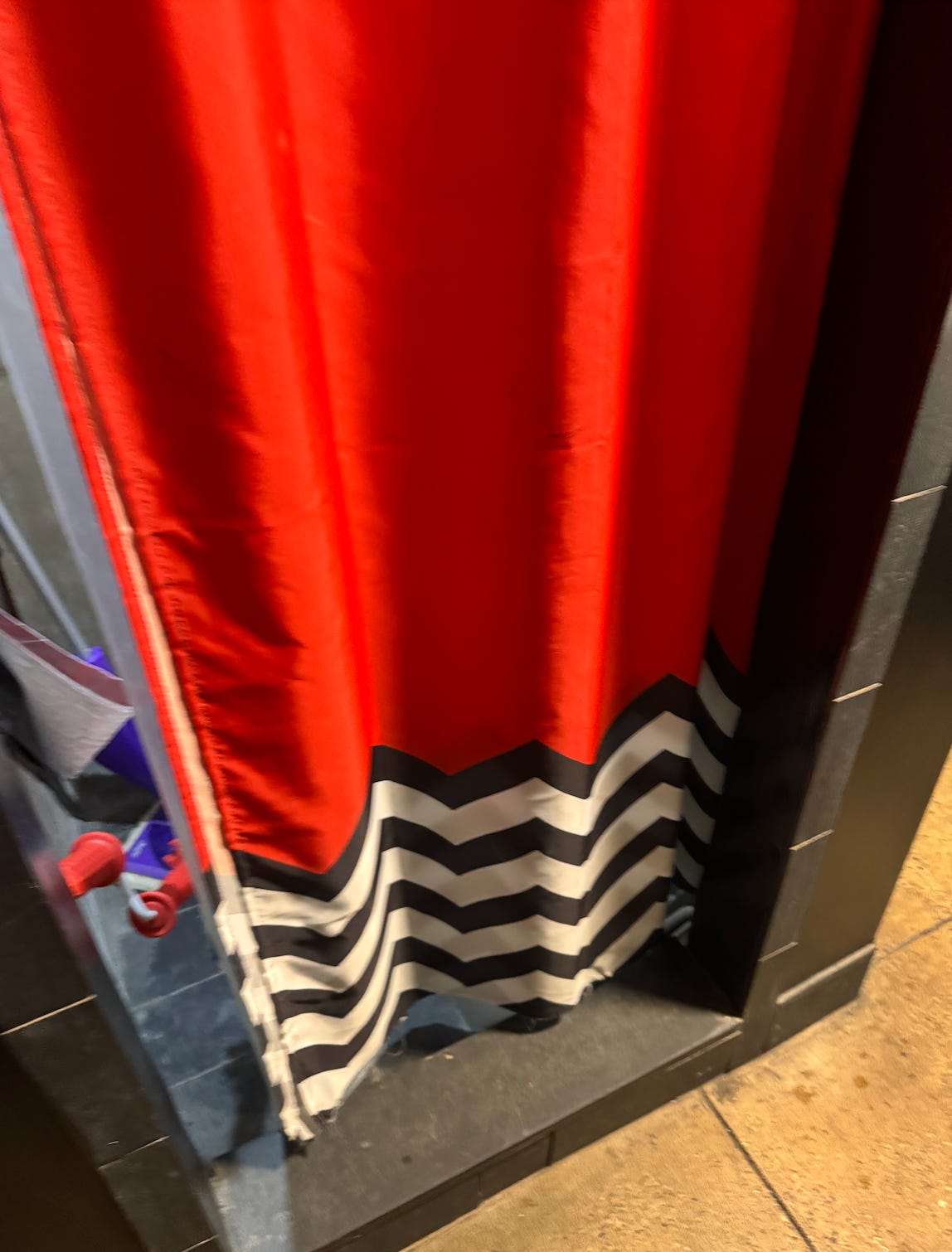An interview with Michael Horse, from 'Twin Peaks'
My conversation with the man who played Deputy Hawk on the original Twin Peaks, as well as 'The Return'
Note: Earlier this month, I attended an event at PhilaMOCA in Philadelphia, a venue long associated with David Lynch, to celebrate the 35th anniversary of the 1990 debut of Twin Peaks. Michael Horse, who played Deputy Hawk on Twin Peaks, was the guest of honor, sitting for a Q&A and signing autographs, while the event also featured a musical performance by the Ghostwood Orchestra, an ensemble that played a selection of Angelo Badalamenti’s music from the show.
I previewed the event for Broad Street Review, for which I had a chance to speak to Michael Horse on the phone. Here’s an extended version of that interview, with some photographic highlights of a memorable evening at PhilaMOCA. In the interview, we discussed Twin Peaks, his long career, and how a guy who spent most of his life in warmer climates ended up living in Northern Minnesota.
SS: So how’d you end up in Minnesota?
Michael Horse: My wife is a climate activist. Both of us thought we’d retire to Mexico. I grew up in Arizona and California, and she said no, ‘got to get us a place where there’s going to be some water in 10 years, and we’re moving to Minnesota.’ I went no no. I thought I’d hate it and I really don’t. I really like it up here.
David [Lynch] and I, we had a talk, I’m glad I got to see him a couple of months before he passed. He didn’t want to talk about the movies or anything, he wanted to talk about all the different kinds of trees I had.
SS: Trees were a big part of Twin Peaks, weren’t they?
MH: The trees became a character, just like the rest of us. It happens in a lot of movies, like Monument Valley for John Ford.
SS: Tell me the story of how you got into the David Lynch orbit. I guess you were in a short film of his, before Twin Peaks?
MH: Russ Tamblyn and Dean Stockwell were my neighbors, up in the Santa Monica mountains. And they came by one day, they had the Blue Velvet guy with them.
SS: Dennis Hopper?
MH: They had Hopper with them, and they had David. And when they left I was asking them, ‘Who’s that guy?’ And they said, he’s a filmmaker, and they showed me the film, [‘The Grandmother], and I went ‘wow.’ Then he called me to do something for the French Bicentennial, with Harry Dean [Stanton], and I asked him, ‘What are you going to do next,’ and he said ‘a TV series.’ I said ‘for cable,’ and he said ‘no, for network TV,’ and I said, ‘yea, call me when that happens.’”
You know we changed the way that people process TV. I mean, we knew we were doing something special, but 25 years later, to realize the impact that we made, I mean, everything's got Twin Peaks’ DNA all over it. They’re not even trying to hide it. There’s actually a wink and a nod, even David Chase who did The Sopranos said, ‘I couldn't have done those dream scenes if David hadn't opened up all those doors for us.’
Even though [Lynch and I] grew up in different cultural backgrounds, we had a lot of similarities. You know, we both grew up in the 1950s, that ‘Leave it to Beaver’ era, under the guise of the atomic bomb. And then the sixties came and that, you know, that cosmic meatball just whacked us all upside the head, and opened, up a whole new, new way of looking at film and music and art. And we were both painters.
The one thing that I really admired about him as an artist is compromise was not in his lexicon.
SS: When it comes to The Return, what was it like to step into that role again after 25 years?
MH: You know, it was amazing. People would ask me, do you think that Twin Peaks should come back again? And I thought, maybe it didn't, I thought, it died before its time and had that kind of James Dean mystique about it.
I think if it would have come back before 25 years, it wouldn't have had the impact. But it was like no time had left at all,
I was thinking, I wonder how it's going to be. Kyle's a big star. First day of being up on the setup here in the forest, he comes out in that dark makeup and went, hi, Michael, how's everything going? How's your family? And, you know, we're all really close, me and Harry Goaz all the time, and Dana and I talk, and Kimmy and I talk, and, you know, we knew that we were involved in something that was the groundbreaking art for TV.
SS: So I want to ask about Twin Peaks fandom. This is something I've written about a couple of times over the years, where it just seems like Twin Peaks' fandom is different from any other fandom. A lot of it has to do with, there just wasn't any new shows for all that time. And so people discovered it at different ages. What are your reflections on that and just the interactions you've had with fans over the years? How is Twin Peaks fandom different?
MH: I don't do a lot of the fan side of things. But sometimes I'll show up and it's never about fame. It's about being in David's world. I mean, I got Walker, Texas Ranger fans who scare the shit out of me, they’re like, ‘will you sign my baby.’
It’s interesting that young people really like it now. Because it’s slow. And I realize that you cannot multitask and watch Twin Peaks. You cannot be on your phone. I know that sometimes that's a brand new experience for younger people that they have to totally be immersed into the Twin Peaks world and I think that's fascinating to them.
SS: So the night after your event, the same venue is going to show the Catherine Coulsen documentary, which I understand you’re in.
MH: Jack [Nance, from Eraserhead and Twin Peaks] and I were really close. Her and Jack were an item, for years. I was renting my art studio from an agent, I wasn’t even in the movies back then. One of my prized possessions is, one day I get Jack aside and said, “Hey, I’m an out there guy- what the heck did Eraserhead mean? So I have a picture of him from Eraserhead, signed, “Figure it out yet?, Love Jack.”
Catherine was a friend. And the relationship that Hawk and her had was very unique from anybody else in Twin Peaks. Hawk was an interesting character. Hawk was one of the very few people who actually knew what was going on in that environment.
I'm the most un-new age guy in the freaking world, but we as indigenous people understand that the forest is alive. I mean, there's a scientific fact, that trees communicate with each other, and the forest communicates with the animals, and if you're in the right frame of mind, they'll both communicate with you.
So talking to the log and talking to the owls made total sense to me, both as Michael Horse and as the character of Hawk.
SS: So the event in Philadelphia is on the 8th, which is the exact 35th anniversary of the debut of Twin Peaks. Does it feel like it’s been 35 years?
MH: It feels like less. It feels like I have to sometimes put in perspective that was so long ago and so many changes in my life have happened in that span of things but it seems like only yesterday to me.
SS: And finally, any other reflections on the passing of David Lynch?
MH: Just what an exceptional person he was. And you know, it's been such a joy and an honor just to be a small dot of color on that man's amazing palette. I am so, so grateful. You don’t get a chance to do art in television. But if I never did anything else ever in my career again to just be a part of Twin Peaks, it's just so, so special to me. But David was a kind man, he was a very kind and very gentle man.






lovely words!